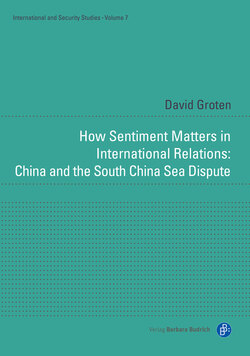Читать книгу How Sentiment Matters in International Relations: China and the South China Sea Dispute - David Groten - Страница 22
На сайте Литреса книга снята с продажи.
2.2.3 Hypothesis III: ‘A causal correlation between (dis)respect experiences and the type of policy recommendations and preferences advocated by FPTT scholars is plausible’
ОглавлениеThe third hypothesis closely traces and examines policy recommendations and preference patterns in order to verify the thesis that a causal mechanism between (dis)respect experiences and the type of [47] recommendations/preferences, particularly in terms of their implied level of cooperation, is plausible. This verification proceeds in two consecutive stages. First, it is scrutinized as to whether correlative patterns (see chapter 4.4) between adequate/inadequate recognition of both Chinese respect needs and expectations57, on the one hand, and the endorsement of cooperative/less cooperative policy measures, on the other hand, can be observed. This serves the purpose of determining as to whether or not (an increase in) disrespect experiences can plausibly account for the shift in Beijing’s SCS policy from restraint, low profile, stability and cooperation toward a much bolder, proactive and assertive approach in recent years. At the same time, this section scrutinizes the extent to which a widening gap between Chinese self-worth conceptions and recognition thereof by external SCS stakeholders may have affected the type of cooperation/non-cooperation advocated by FPTT scholars (intervening variable). Second, it is examined whether the presence or absence of disrespect experiences can account for the type of recommendation endorsed (or verbal complaint articulated), hence confirming the plausibility of a causal mechanism. The first ideal-type logic underlying this plausibility probe is as follows: If external behavior is regarded as a denial of respect (inadequate consideration), Chinese FPTTs are more inclined to suggest (or deem appropriate) policy measures of non-cooperation or even confrontation and, at the same time, are less keen to advocate concessions and cooperation58. At least, such a cooperative attitude will be made contingent on certain terms and conditions if a certain degree of disrespect prevails. A lack of due respect, thus, facilitates an ever-increasing respect sensitivity among Chinese policy actors vis-à-vis external actors59. In this vein, limited cooperation or non-cooperation is expected to be endorsed for two reasons: first, the urge to re-establish China’s self-worth, especially adequate external recognition of its identity and status conceptions; second, retaliation with the goal of “educating the offender” (Miller, 2001, pp. 540–541) by sending a firm and abundantly [48] clear message to the offender, thereby demonstrating the unwillingness of being treated this way (chapter 4.4.5). The second ideal-type logic presupposes that adequate respect (here: the lack of disrespect experiences) encourages Chinese scholars to advocate the making of concessions and to engage in cooperation with other SCS stakeholders60. That said, the following questions guide the discussion of Hypothesis III in particular:
- Which (political, legal, military, economic) measures pertaining to China’s SCS policy are recommended or advocated by FPTT scholars?
- To what extent can these measures be classified as conditional/limited cooperation (sub-category III.II61) or non-cooperation/confrontation (subcategory III.III)?
- Are these measures accompanied by a reference to the alleged offender?
- Is it plausible that disrespect experiences prompted analysts to put forward retaliatory measures in response (and vice versa)? (criteria A–D62)
- How are these retaliatory measures/preferences explained? Are there any indications that policy preferences/recommendations involving elements of confrontation are regarded as increasingly justifiable and legitimate due to disrespect experiences made in the past?63
- Can a correlation between FPTT scholars’ propensity to advocate or recommend retaliatory policy measures and a low level of empathy for respect needs and expectations of China’s counterparts and a low level of self-criticism regarding potential negative effects of China’s conduct on others’ respect needs be observed?
[49] The final question on China’s sensitivity and empathy regarding other countries’ needs and respect considerations is particularly interesting, also from an empirical point of view. It relates to this book’s point of departure, the proposition that an increase in empathy and consideration of other parties’ interests is required to mitigate conflicts and to create mutual trust and confidence instead. Asymmetry of sensitivity (or mismatch) is expected nonetheless. In total, Hypothesis III concerns the output dimension of respect.
